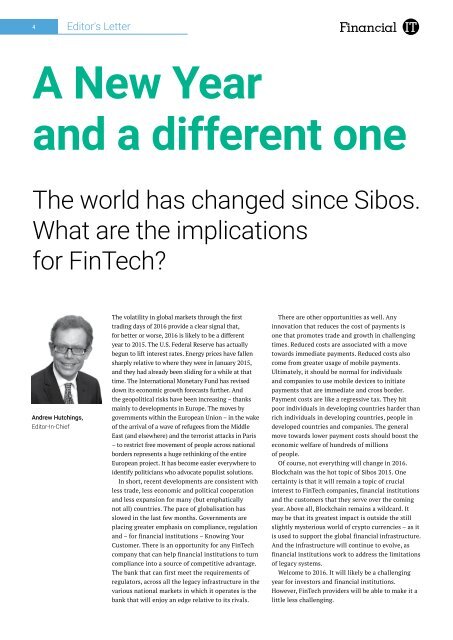Revolutionizing the Financial Markets
Cím: Forradalmasítja a pénzügyi piacok Leírást/ellenőrzések: Több mint 100 000 előfizetőt, amelyek 70 %-a bankok, a pénzügyi az összpontosított közzététele a vezető pénzügyi technológiai hírek a világ, beleértve a technológia blockchain és a cryptocurrencies.
Cím: Forradalmasítja a pénzügyi piacok
Leírást/ellenőrzések: Több mint 100 000 előfizetőt, amelyek 70 %-a bankok, a pénzügyi az összpontosított közzététele a vezető pénzügyi technológiai hírek a világ, beleértve a technológia blockchain és a cryptocurrencies.
- No tags were found...
You also want an ePaper? Increase the reach of your titles
YUMPU automatically turns print PDFs into web optimized ePapers that Google loves.
4<br />
Editor's Letter<br />
A New Year<br />
and a different one<br />
The world has changed since Sibos.<br />
What are <strong>the</strong> implications<br />
for FinTech?<br />
Andrew Hutchings,<br />
Editor-In-Chief<br />
The volatility in global markets through <strong>the</strong> first<br />
trading days of 2016 provide a clear signal that,<br />
for better or worse, 2016 is likely to be a different<br />
year to 2015. The U.S. Federal Reserve has actually<br />
begun to lift interest rates. Energy prices have fallen<br />
sharply relative to where <strong>the</strong>y were in January 2015,<br />
and <strong>the</strong>y had already been sliding for a while at that<br />
time. The International Monetary Fund has revised<br />
down its economic growth forecasts fur<strong>the</strong>r. And<br />
<strong>the</strong> geopolitical risks have been increasing – thanks<br />
mainly to developments in Europe. The moves by<br />
governments within <strong>the</strong> European Union – in <strong>the</strong> wake<br />
of <strong>the</strong> arrival of a wave of refugees from <strong>the</strong> Middle<br />
East (and elsewhere) and <strong>the</strong> terrorist attacks in Paris<br />
– to restrict free movement of people across national<br />
borders represents a huge rethinking of <strong>the</strong> entire<br />
European project. It has become easier everywhere to<br />
identify politicians who advocate populist solutions.<br />
In short, recent developments are consistent with<br />
less trade, less economic and political cooperation<br />
and less expansion for many (but emphatically<br />
not all) countries. The pace of globalisation has<br />
slowed in <strong>the</strong> last few months. Governments are<br />
placing greater emphasis on compliance, regulation<br />
and – for financial institutions – Knowing Your<br />
Customer. There is an opportunity for any FinTech<br />
company that can help financial institutions to turn<br />
compliance into a source of competitive advantage.<br />
The bank that can first meet <strong>the</strong> requirements of<br />
regulators, across all <strong>the</strong> legacy infrastructure in <strong>the</strong><br />
various national markets in which it operates is <strong>the</strong><br />
bank that will enjoy an edge relative to its rivals.<br />
There are o<strong>the</strong>r opportunities as well. Any<br />
innovation that reduces <strong>the</strong> cost of payments is<br />
one that promotes trade and growth in challenging<br />
times. Reduced costs are associated with a move<br />
towards immediate payments. Reduced costs also<br />
come from greater usage of mobile payments.<br />
Ultimately, it should be normal for individuals<br />
and companies to use mobile devices to initiate<br />
payments that are immediate and cross border.<br />
Payment costs are like a regressive tax. They hit<br />
poor individuals in developing countries harder than<br />
rich individuals in developing countries, people in<br />
developed countries and companies. The general<br />
move towards lower payment costs should boost <strong>the</strong><br />
economic welfare of hundreds of millions<br />
of people.<br />
Of course, not everything will change in 2016.<br />
Blockchain was <strong>the</strong> hot topic of Sibos 2015. One<br />
certainty is that it will remain a topic of crucial<br />
interest to FinTech companies, financial institutions<br />
and <strong>the</strong> customers that <strong>the</strong>y serve over <strong>the</strong> coming<br />
year. Above all, Blockchain remains a wildcard. It<br />
may be that its greatest impact is outside <strong>the</strong> still<br />
slightly mysterious world of crypto currencies – as it<br />
is used to support <strong>the</strong> global financial infrastructure.<br />
And <strong>the</strong> infrastructure will continue to evolve, as<br />
financial institutions work to address <strong>the</strong> limitations<br />
of legacy systems.<br />
Welcome to 2016. It will likely be a challenging<br />
year for investors and financial institutions.<br />
However, FinTech providers will be able to make it a<br />
little less challenging.



